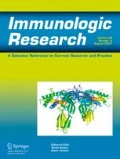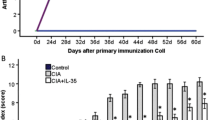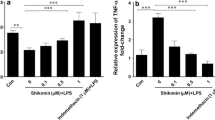Abstract
Rheumatoid arthritis (RA) is a systemic autoimmune disease, characterized by the irreversible joint destruction resulted from the attack of inflammatory cells to the joints. Recent studies demonstrated that crocin is able to alleviate arthritis and suppress inflammatory responses, implying crocin as a potential promising antiarthritic agent. In this study, we confirmed the effect of crocin on RA and revealed its underlying mechanism by measuring lipopolysaccharides (LPS)-stimulated cytokine production in presence or absence of crocin. The effect of crocin was also tested in vivo using a mouse model of collagen-induced arthritis (CIA). It was found that crocin significantly repressed the LPS-induced expression of tumor necrosis factor (TNF)-α, interleukin (IL)-1β, and IL-6 in human fibroblast-like synoviocytes (FLS). We tested the effect of crocin on nuclear factor-kappa B (NF-κB) signaling and observed that cells pre-treated with 500 μM of crocin exhibited lower levels of LPS-induced p-IκBα, p-IκB kinase (IKK) α/β, and p65 expression than those of untreated cells. In addition, we found when cells were stimulated with IKKβ, crocin pre-treatment showed significantly inhibitory effect on the luciferase activity of IL-1β. In vivo results also showed that crocin treatment dramatically reduced plasma levels of TNF-α, IL-1β, and IL-6 in CIA mice. Crocin is efficient to suppress the productions of TNF-α, IL-6, and IL-1β by blocking NF-κB signal activation through its interaction with IKK, suggesting that crocin could be an efficient treatment for RA.






Similar content being viewed by others
References
Tabas I, Glass CK. Anti-inflammatory therapy in chronic disease: challenges and opportunities. Science. 2013;339:166–72.
Meune C, Touze E, Trinquart L, Allanore Y. Trends in cardiovascular mortality in patients with rheumatoid arthritis over 50 years: a systematic review and meta-analysis of cohort studies. Rheumatology (Oxford). 2009;48:1309–13. https://doi.org/10.1093/rheumatology/kep252.
Avina-Zubieta JA, Choi HK, Sadatsafavi M, Etminan M, Esdaile JM, Lacaille D. Risk of cardiovascular mortality in patients with rheumatoid arthritis: a meta-analysis of observational studies. Arthritis Rheum. 2008;59:1690–7. https://doi.org/10.1002/art.24092.
Ajeganova S, van Steenbergen HW, van Nies JA, Burgers LE, Huizinga TW, van der Helm-van Mil AH. Disease-modifying antirheumatic drug-free sustained remission in rheumatoid arthritis: an increasingly achievable outcome with subsidence of disease symptoms. Ann Rheum Dis. 2016;75:867–73. https://doi.org/10.1136/annrheumdis-2014-207080.
Emery P, Keystone E, Tony H, Cantagrel A, Van Vollenhoven R, Sanchez A, et al. IL-6 receptor inhibition with tocilizumab improves treatment outcomes in patients with rheumatoid arthritis refractory to anti-tumour necrosis factor biologicals: results from a 24-week multicentre randomised placebo-controlled trial. Ann Rheum Dis. 2008;67:1516–23.
Komano Y, Tanaka M, Nanki T, Koike R, Sakai R, Kameda H, et al. Incidence and risk factors for serious infection in patients with rheumatoid arthritis treated with tumor necrosis factor inhibitors: a report from the registry of Japanese rheumatoid arthritis patients for longterm safety. J Rheumatol. 2011;38:1258–64. https://doi.org/10.3899/jrheum.101009.
Yamamoto Y, Gaynor RB. IκB kinases: key regulators of the NF-κB pathway. Trends Biochem Sci. 2004;29:72–9.
Israël A. The IKK complex, a central regulator of NF-κB activation. Cold Spring Harb Perspect Biol. 2010;2:a000158.
Gilston V, Jones HW, Soo CC, Coumbe A, Blades S, Kaltschmidt C, et al. NF-kappa B activation in human knee-joint synovial tissue during the early stage of joint inflammation. Biochem Soc Trans. 1997;518S:25.
Roman-Blas J, Jimenez S. NF-κB as a potential therapeutic target in osteoarthritis and rheumatoid arthritis. Osteoarthr Cartil. 2006;14:839–48.
Makarov SS. NF-κB in rheumatoid arthritis: a pivotal regulator of inflammation, hyperplasia, and tissue destruction. Arthritis Res Ther. 2001;3:200.
Nam KN, Park YM, Jung HJ, Lee JY, Min BD, Park SU, et al. Anti-inflammatory effects of crocin and crocetin in rat brain microglial cells. Eur J Pharmacol. 2010;648:110–6. https://doi.org/10.1016/j.ejphar.2010.09.003.
Yarijani ZM, Pourmotabbed A, Pourmotabbed T, Najafi H. Crocin has anti-inflammatory and protective effects in ischemia-reperfusion induced renal injuries. Iran J Basic Med Sci. 2017;20:753.
Ding Q, Zhong H, Qi Y, Cheng Y, Li W, Yan S, et al. Anti-arthritic effects of crocin in interleukin-1beta-treated articular chondrocytes and cartilage in a rabbit osteoarthritic model. Inflamm Res. 2013;62:17–25. https://doi.org/10.1007/s00011-012-0546-3.
Li X, Jiang C, Zhu W. Crocin reduces the inflammation response in rheumatoid arthritis. Biosci Biotechnol Biochem. 2017;81:891–8. https://doi.org/10.1080/09168451.2016.1263145.
Smolen JS, Steiner G. Therapeutic strategies for rheumatoid arthritis. Nat Rev Drug Discov. 2003;2:473–88. https://doi.org/10.1038/nrd1109.
Smolen JS, Aletaha D, Koeller M, Weisman MH, Emery P. New therapies for treatment of rheumatoid arthritis. Lancet. 2007;370:1861–74. https://doi.org/10.1016/S0140-6736(07)60784-3.
Muller-Ladner U, Pap T, Gay RE, Neidhart M, Gay S. Mechanisms of disease: the molecular and cellular basis of joint destruction in rheumatoid arthritis. Nat Clin Pract Rheumatol. 2005;1:102–10. https://doi.org/10.1038/ncprheum0047.
Feldmann M, Maini RN. Anti-TNFα therapy of rheumatoid arthritis: what have we learned? Annu Rev Immunol. 2001;19:163–96.
Maini R, Taylor P. Anti-cytokine therapy for rheumatoid arthritis. Annu Rev Med. 2000;51:207–29.
Genovese MC, Bathon JM, Martin RW, Fleischmann RM, Tesser JR, Schiff MH, et al. Etanercept versus methotrexate in patients with early rheumatoid arthritis: two-year radiographic and clinical outcomes. Arthritis Rheum. 2002;46:1443–50. https://doi.org/10.1002/art.10308.
St Clair EW, van der Heijde DM, Smolen JS, Maini RN, Bathon JM, Emery P, et al. Combination of infliximab and methotrexate therapy for early rheumatoid arthritis: a randomized, controlled trial. Arthritis Rheumatol. 2004;50:3432–43.
Breedveld FC, Weisman MH, Kavanaugh AF, Cohen SB, Pavelka K, Vollenhoven RV, et al. The PREMIER study: a multicenter, randomized, double-blind clinical trial of combination therapy with adalimumab plus methotrexate versus methotrexate alone or adalimumab alone in patients with early, aggressive rheumatoid arthritis who had not had previous methotrexate treatment. Arthritis Rheumatol. 2006;54:26–37.
Lv B, Huo F, Zhu Z, Xu Z, Dang X, Chen T, et al. Crocin upregulates CX3CR1 expression by suppressing NF-kappaB/YY1 signaling and inhibiting lipopolysaccharide-induced microglial activation. Neurochem Res. 2016;41:1949–57. https://doi.org/10.1007/s11064-016-1905-1.
Du J, Chi Y, Song Z, Di Q, Mai Z, Shi J, et al. Crocin reduces aspergillus fumigatus-induced airway inflammation and NF-kappaB signal activation. J Cell Biochem. 2017;119:1746–54. https://doi.org/10.1002/jcb.26335.
Li S, Liu X, Lei J, Yang J, Tian P, Gao Y. Crocin protects podocytes against oxidative stress and inflammation induced by high glucose through inhibition of NF-κB. Cell Physiol Biochem. 2017;42:1481–92.
Benito MJ, Murphy E, Murphy EP, van den Berg WB, FitzGerald O, Bresnihan B. Increased synovial tissue NF-κB1 expression at sites adjacent to the cartilage–pannus junction in rheumatoid arthritis. Arthritis Rheumatol. 2004;50:1781–7.
Carlsen H, Moskaug JØ, Fromm SH, Blomhoff R. In vivo imaging of NF-κB activity. J Immunol. 2002;168:1441–6.
Handel ML, Mcmorrow LB, Gravallese EM. Nuclear factor–kB in rheumatoid synovium. Localization of P50 and P65. Arthritis Rheumatol. 1995;38:1762–70.
Fu L, Pan F, Jiao Y. Crocin inhibits RANKL-induced osteoclast formation and bone resorption by suppressing NF-κB signaling pathway activation. Immunobiology. 2017;222:597–603.
Author information
Authors and Affiliations
Corresponding author
Ethics declarations
Conflict of interest
The authors declare that they have no conflict of interest.
Research involving human participants and/or animals
All applicable international, national, and/or institutional guidelines for the care and use of animals were followed.
Informed consent
Informed consent is not applicable in this study.
Rights and permissions
About this article
Cite this article
Li, L., Zhang, H., Jin, S. et al. Effects of crocin on inflammatory activities in human fibroblast-like synoviocytes and collagen-induced arthritis in mice. Immunol Res 66, 406–413 (2018). https://doi.org/10.1007/s12026-018-8999-2
Published:
Issue Date:
DOI: https://doi.org/10.1007/s12026-018-8999-2




